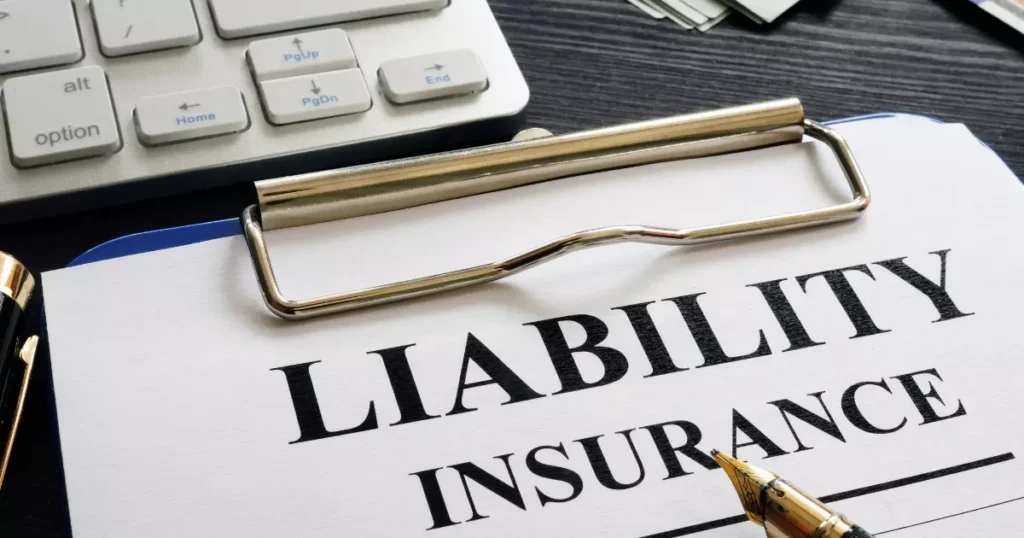Why Liability Insurance for Small Businesses is A Must-Have Protection
Liability insurance for small businesses protects against costly risks. Many believe it’s only for large corporations. However, every business, regardless of size, faces risks like bodily injury, property damage, and lawsuits. Small businesses are especially vulnerable to these challenges.
Without coverage, a single claim could lead to financial ruin. Medical expenses, legal costs, and settlements can quickly disrupt operations. They can also harm your reputation. Liability insurance provides essential protection. It shields your business from lawsuits and covers medical bills. It ensures financial stability and allows you to focus on growth. Don’t wait—secure liability insurance today.
What is Liability Insurance for Small Businesses?

Liability insurance for small businesses is a safety net. It protects businesses from financial risks caused by accidents, lawsuits, or damages. This type of business insurance covers claims related to bodily injury, property damage, and legal costs.
For example, if a customer slips in your store, liability insurance helps cover medical expenses. It also covers legal defense costs if the customer files a lawsuit. Liability insurance is essential for small business owners who face daily risks. It also protects against advertising injury or professional mistakes. Policies are flexible and can be tailored to different business types. Check out our guide to business liability insurance to know how to safeguard your business.
Why Liability Insurance for Small Businesses is Essential: 5 Key Reasons
Liability insurance is more than just a safety net; it’s a smart investment. It shields small businesses from unexpected risks that could lead to financial trouble. With the right coverage, you can focus on growth without worrying about costly claims.
Here are five key reasons why it’s essential for your business.
Protection Against Costly Lawsuits
Liability insurance acts as a shield against expensive legal battles. A potential lawsuit can stem from property damage or a work-related injury. It also covers advertising disputes that may arise. Without insurance, legal defense costs and settlements can be overwhelming. It covers medical costs for third parties injured on your premises. This protection ensures your business remains financially stable during unexpected claims.
Compliance with Legal and Contractual Requirements
Liability insurance is often required by law or industry standards. Many contracts demand proof of coverage to secure projects or partnerships. Without it, your business may face delays or missed opportunities. Lack of insurance can also result in fines and penalties. Meeting these requirements shows your commitment to legal and ethical practices.
Financial Security for Unexpected Events
Accidents and mistakes can happen anytime. Liability insurance is like a health insurance plan that covers costs like medical expenses for injuries and property damage. It also protects against security risks that can lead to claims. When these events occur, insurance handles the associated expenses. This ensures your business can face challenges without financial strain.
Enhanced Credibility and Trust
Liability insurance builds trust with clients and partners. It shows you are prepared to handle risks responsibly. Customers value businesses that prioritize safety and professionalism. Insurance reassures them that claims or lawsuits will not disrupt services. This trust strengthens relationships and encourages repeat business.
Business Continuity During Claims
Claims like slip-and-fall incidents can disrupt daily operations. Liability insurance minimizes the impact of these events. It covers legal costs, medical expenses, and settlements. This allows you to stay focused on running your business. With the right coverage, your business stays resilient during challenging times.
What Does Liability Insurance for Small Businesses Cover?

Liability insurance for small businesses provides essential protection. It shields business owners from financial losses caused by accidents, lawsuits, or claims. This type of business insurance is crucial for maintaining financial stability. It also helps protect business operations from unexpected disruptions. Here’s a closer look at what it covers:
Bodily Injury
Liability insurance for small businesses covers medical expenses. This applies if someone gets injured on your business property. For example, a customer might slip and fall in your store. The insurance pays for their treatment, including doctor visits and hospital bills. It also provides liability coverage for legal expenses. This applies if the injured person sues your business.
Without liability insurance, these costs could quickly add up. Medical bills and legal fees can become a major financial burden. For small business owners, this type of coverage is a critical safety net.
Property Damage
This coverage protects your business if you or your employees damage someone else’s property. For instance, an employee might accidentally damage a client’s equipment during a service call. Liability insurance can cover the cost of repairs. It can also help pay for replacements if the damage is severe.
Businesses that work in client homes or offices face this risk often. Without coverage, the costs for property damage would come out of your pocket. This could strain your business finances, especially for smaller operations.
Legal Costs
Lawsuits can be expensive and time-consuming. An employee practice liability insurance helps cover legal costs if your business faces a claim. This includes attorney fees and court expenses. It also covers settlements if the case is resolved outside of court.
If the lawsuit results in a judgment against your business, the insurance can help pay for that too. Without liability insurance, legal defense costs could drain your resources. These disruptions could harm your normal business operations. Check out our article on why employment practice liability insurance is important to learn more.
Advertising Injury
Liability insurance also protects your business from claims related to advertising. This includes issues like copyright infringement, defamation, or invasion of privacy. For example, a competitor might claim that you copied their slogan or branding.
The insurance covers legal defense costs if such a claim arises. It may also cover any settlement or damages awarded to the other party. Advertising disputes are common, especially in competitive industries. Liability insurance ensures your business is prepared for these challenges.
Product Liability
If your business sells products, this coverage is essential. It protects against claims that a faulty product caused harm or damage. For instance, a customer might get injured while using one of your products.
Liability insurance helps cover their medical expenses. It also covers legal costs if they decide to sue your business. Manufacturers, retailers, and wholesalers rely heavily on product liability coverage. Without it, a single claim could result in significant financial losses.
Professional Negligence
Professional liability insurance covers mistakes or errors in your work. For example, a tax professional might provide incorrect advice to a client. If the client suffers financial losses, they could file a claim against your business.
This type of insurance helps cover the cost of legal defense. It also covers any compensation you may owe the client. This coverage is essential for service providers like consultants, accountants, and designers.
How Much Does Liability Insurance for Small Businesses Cost?
The cost of liability insurance for small businesses varies. Factors like business type, size, location, and coverage limits affect premiums. On average, small business owners pay about $42 per month for general liability insurance. This adds up to approximately $500 annually.
Some businesses pay less than $30 per month, while others pay more. High-risk industries or larger businesses typically face higher costs. The type of coverage you choose also affects the price. Options like professional liability insurance or commercial property insurance can change the cost.
To get accurate liability insurance quotes, consult an insurance agent or broker. They can help assess your risks and recommend suitable liability policies.
How to Get Liability Insurance for Your Small Business

Securing liability insurance for your small business is an essential step. It protects your business from financial losses caused by claims and lawsuits. To find the right policy, follow a structured process. This includes assessing risks, gathering information, researching providers, and finalizing your coverage. Each step helps you select liability insurance that suits your needs. It also ensures the coverage aligns with your budget.
Assess Your Business Risks
Start by identifying the risks your business faces. Consider the type of industry you work in and the nature of your operations. For example, a retail store may face risks like customer injuries from slips or falls. A consultant, on the other hand, may deal with claims of professional negligence or omissions.
Understanding these risks helps you determine the type of insurance coverage you need. Some businesses may require professional liability insurance. Others may need general liability insurance or a combination of both. If you need clarification, consult with a licensed insurance agent. They can help you evaluate risks and recommend appropriate policies.
Gather Necessary Information
Prepare all the necessary details about your business before applying. Start with basic information like your business name, location, and structure. For example, identify whether your business operates as a sole proprietorship. Alternatively, it could be a partnership or a limited liability company. Knowing your business structure is essential when applying for liability insurance.
Include specifics about your annual revenue and the number of employees you have. If you own commercial property or vehicles, add those details too. Insurance companies may also ask about past claims, lawsuits, or accidents.
Providing accurate information helps you get liability insurance quotes that match your needs. Complete details help tailor liability insurance quotes to your business. They ensure that the coverage matches your specific risks and operational needs.
Research and Compare Providers
Take time to research multiple insurance providers. Look for companies with a strong reputation for customer service and claims handling. Check online reviews and ratings from other small business owners.
Compare liability policies offered by different providers. Focus on factors like coverage limits, liability insurance premiums, and additional options. Some providers offer bundled policies for added convenience. These may include commercial property insurance or cyber liability insurance. Bundled options can provide broader coverage for your business.
These options can provide extra protection for your business. Comparing policies helps you find the best fit for your needs.
Choose The Right Coverage and Finalize
Once you have reviewed your options, select the policy that fits your risks. Make sure it includes essential coverage areas like bodily injury and property damage. Review the policy limits, deductibles, and premium amounts carefully.
Ensure the policy meets any legal or contractual requirements for your business. For example, some contracts may require a specific liability limit or proof of coverage. Once you’re satisfied, finalize the policy with your insurance provider. Request a certificate of insurance as proof of coverage. This document is important for building trust with clients and partners.
Frequently Asked Questions
Is liability insurance mandatory for all small businesses?
Business liability insurance is not legally required for every business. However, some industries and contracts may require liability insurance coverage. For example, landlords or clients may ask for proof of insurance. Even when not mandatory, it is essential for managing liability claims.
How do I determine how much liability coverage my business needs?
Start by evaluating the level of risk in your business. High-risk industries, like construction, often need higher liability insurance coverage. Businesses offering professional services may need specific types of coverage. One example is professional liability insurance, which protects against service-related claims. Speak with an insurance agent to determine the right coverage for your needs.
What happens if a claim exceeds my coverage limits?
If a liability claim exceeds your policy limits, you must pay the remaining amount. This may include legal fees, damages, or settlements. To avoid this, choose adequate coverage limits for your business. Adding umbrella liability insurance can provide extra protection.
Can I customize my liability insurance policy to fit my industry?
Yes, liability insurance coverage can be customized. Businesses offering professional services can include professional liability coverage in their policy. Retailers or manufacturers may need product liability insurance. Customizing types of coverage ensures the policy meets your specific risks.
How do I file a claim under my liability insurance policy?
Contact your insurance company immediately after an incident. Provide all necessary details about the liability claim. This includes what happened, who was involved, and any damages. Submit documents like photos or medical bills to support the claim. Your insurer will guide you through the process.
Is it possible to bundle liability insurance with other types of coverage?
Yes, many providers offer bundled policies. Business liability insurance can be combined with commercial property insurance. Cyber liability insurance can also be included in a bundle. Bundling policies can reduce insurance rates and simplify management.
How can I lower my liability insurance rates?
Lowering insurance rates requires reducing risks. Implement safety measures and train employees to prevent accidents. Choose a higher deductible to reduce your monthly premiums. Compare insurance rates from multiple providers to find the best deal.
Read also: Workers’ Compensation Insurance
Wrapping Up
Liability insurance for small businesses is essential for protecting your business. It shields you from unexpected financial losses. These may come from lawsuits, medical expenses, or property damage. With the right coverage, you can focus on growing your business. You won’t have to worry about liability claims disrupting your operations.
Liability insurance provides peace of mind. It protects your business from unexpected challenges and ensures financial stability. It also enhances your credibility with clients and partners by demonstrating preparedness.
So don’t leave your business vulnerable. Take the next step to secure your future. Contact Luxe Insurance Brokers at 480-568-2566 for personalized business liability insurance solutions. We create tailored policies that fit your business needs and risk level. Trust us to safeguard your business and provide competitive insurance rates. Get started today and protect your business with the best coverage available.
